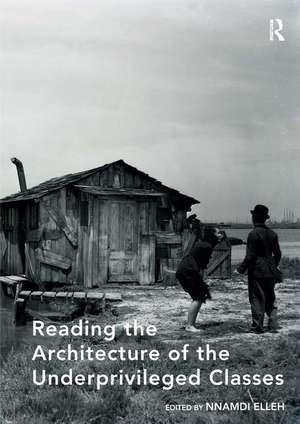Reading the Architecture of the Underprivileged Classes
Autor Nnamdi Ellehen Limba Engleză Hardback – 13 noi 2014
| Toate formatele și edițiile | Preț | Express |
|---|---|---|
| Paperback (1) | 255.51 lei 6-8 săpt. | |
| Taylor & Francis – 24 iun 2024 | 255.51 lei 6-8 săpt. | |
| Hardback (1) | 771.84 lei 6-8 săpt. | |
| Taylor & Francis – 13 noi 2014 | 771.84 lei 6-8 săpt. |
Preț: 771.84 lei
Preț vechi: 1031.91 lei
-25% Nou
Puncte Express: 1158
Preț estimativ în valută:
147.69€ • 154.75$ • 122.09£
147.69€ • 154.75$ • 122.09£
Carte tipărită la comandă
Livrare economică 12-26 aprilie
Preluare comenzi: 021 569.72.76
Specificații
ISBN-13: 9781409467847
ISBN-10: 1409467848
Pagini: 296
Ilustrații: Includes 103 b&w illustrations
Dimensiuni: 174 x 246 x 21 mm
Greutate: 0.88 kg
Ediția:New ed.
Editura: Taylor & Francis
Colecția Routledge
Locul publicării:Oxford, United Kingdom
ISBN-10: 1409467848
Pagini: 296
Ilustrații: Includes 103 b&w illustrations
Dimensiuni: 174 x 246 x 21 mm
Greutate: 0.88 kg
Ediția:New ed.
Editura: Taylor & Francis
Colecția Routledge
Locul publicării:Oxford, United Kingdom
Notă biografică
Nnamdi Elleh is Associate Professor of architecture history and theory, and the Director of the Master of Science in Architecture Program at the University of Cincinnati, Ohio.
Cuprins
Introduction; I: Context(s) and Theoretical Underpinnings; 1: Reading the Architecture of the Underprivileged Classes; 2: The Global Context(s): Architecture and Urban Revolution(s) to Transform the Society and the Individual, 1900-2014; 3: Architecture of the Underprivileged Classes and Cubism; II: Sustainable Shared Spaces and Experiences of Modernity; 4: House of Blues: The Shotgun and Scarcity Culture in the Mississippi Delta; 5: Cultural facilities in the Opaque Spaces of Brazilian Cities as Instruments of Resistance; 6: Grass Roots Modernism: Architecture and Organization in Austrian Settlements and Allotment Gardens, 1921-1925; 7: A Tiny Whole World: Sustainable Design Lessons from the Architecture of Underprivileged Classes; 8: The Politics of Nation in the Urban Form of Informal Settlements in Quezon City, Philippines; III: Politics and Urban Regulations: Demolished and Refurbished Neighborhoods; 9: Spatial Misreading: South Africa's Urban Future Seen from Within a Township Shack; 10: Preparations for the Sports Mega-Events in Brazil and the Popular Protests of 2013; 11: On Changes in the Dwelling Conditions of the Romanian Roma under Communism; 12: The Political Economy of Low and Moderate Income Urban Residential Development: A Case Study of Port Harcourt, Nigeria; 13: Invisible Visibility: The Abuja Housing Deficit as a Political Mirage; III: Conclusion
Recenzii
’A powerful collection that opens new questions and provides intriguing leads on subjects critical to identities and spaces in cities across five continents, proposing new ways of exploring and understanding relationships between popular and formal design, building and social forms.’ Alan Mabin, University of Pretoria, South Africa ’There are few aspects of 20th-century modernism that have been mostly ignored by architectural historians, but Elleh’s book casts light on one of them: the unplanned areas of cities that the heroic figures of modernism sought to replace. The essays masterfully collected in this volume address neighbourhoods across the globe, and make clear that while the architecture of necessity is modernism’s Other, it is also its parallel. This book doesn’t solve the housing problem, although the knowledge it imparts suggests promising directions. It is difficult for architectural historians to address architecture without architects and without budgets, yet the authors marshalled here demonstrate a thoughtful ability to tackle this unruly and uncomfortable subject. It’s a pleasure to read talented architectural historians and architects who apply their expertise to the thorniest of topics. These neighbourhoods and their creators are not modernity’s opposite, they are a part of it.’ Mark Hinchman, Taylor's University, Malaysia
Descriere
This book not only shows how architects can learn from traditional or vernacular dwellings in order to create habitations for the people of low-income groups in public housing scenarios, but also demonstrates how the architecture of the economically underprivileged classes goes beyond culturally-inspired tectonic interpretations of vernacular traditions by architects for high profile clients. It explores how the resourceful dwellings of the underprivileged inhabitants of the great cities in developing parts of the world pioneered certain concepts of modernism and contemporary design practices such as sustainable and de-constructivist design.












